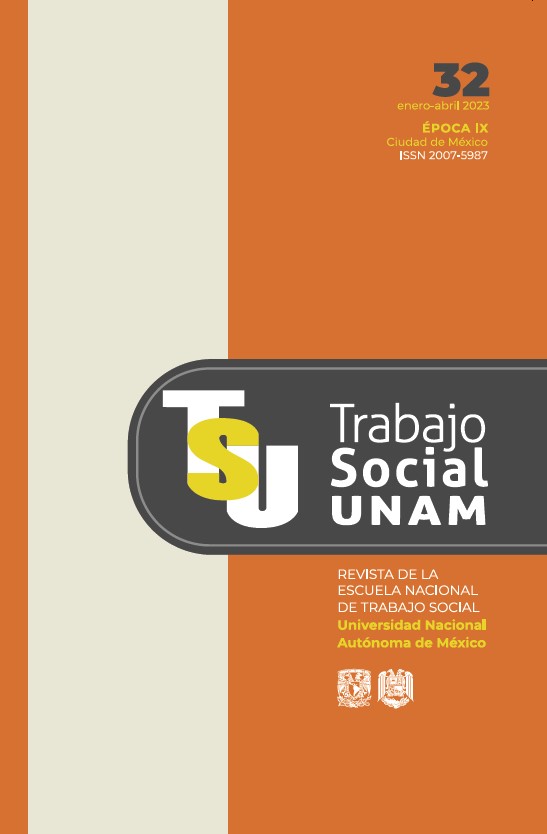Despojos familiares a través de la desaparición forzada y resistencia como habitus de lucha: una lectura desde el caso Ayotzinapa
Main Article Content
Abstract
This essay seeks to share and explain one of several theses resulting from my doctoral work entitled ‘’In the face of disembodiment and annulment, they will not undermine our existence! Proximity Social Work with relatives of murdered and disappeared students from Ayotzinapa, Gro, México’’. Said thesis consists of explaining why forced disappearance is a systematic practice generated in contexts of micro-macro, mutable and porous criminality, as well as a serious violation of human rights, since it is often an expression of negligence and acquiescence with operational responsibility of municipal, state and federal police, which shows two sides of said violation: absence of the state or action for complicity interspersed between the State and organized crime. This text also intends to explain how this thesis works, which underpins the rupture of the level of social organization closest to the existence
and daily life of people and families, since these, in diversified territories affected by violence, absence or imbrication of the State/organized crime, materialize expressions and mechanisms of permanent and latent local social struggle, a constitution that will be explained from the category of Bourdieu’s habitus; how is it that the trajectories and dispositions of the sociosubjective
field of social struggle, is at the same time a legacy of family transmission with a central power in the persistence and resistance of communities and entire peoples before the multidimensional of social injustice, realities of exclusion that have been perpetuated under the neoliberal system. This analysis is also based on the categorical field/habitus dyad proposed by the French sociologist.
Article Details
Citas en Dimensions Service
References
Bourdieu, P. (1994). Razones Prácticas. Sobre la teoría de la acción. Anagrama.
Bourdieu, P. (1997). In Meditaciones pascalianas. Anagrama.
Bourdieu, P., y Sayad, K. (2017). El Desarraigo. La violencia del capitalismo en una sociedad rural. Siglo XXI.
CIDH. (2017, julio 3-7). 163 periodo de sesiones. Comisión Interamericana de Derechos Humanos. https://
www.youtube.com/watch?v=NW1PRD4_TYU
Cuenta Mi Opinión 2.0. (2014, diciembre 05). Home. YouTube. Retrieved March 17, 2023, from http://www.
youtube.com/watch?v=cfLfkPBaK9c&list=PLzvV82JeLWImAzE3ec8NNAAN9akg4tfk&index=59
Jelin, E. (2017). La Lucha por el pasado. Cómo construimos la memoria social. Siglo XXI.
Lowen, A. (2014). La voz del cuerpo / The Language of the Body. Editorial Sirio.
Mbembe, A. (2011). Necropolítica (E. Falomir Archambault, Ed.; E. Falomir Archambault, Trans.). Melusina.
Solís, P. (2017). La discriminación estructural y la desigualdad social. CONAPRED, CEPAL Y SEGOB.
Soria Escalante, H., Orozco Guzmán, M., López Peñaloza, J. y Sigales Ruiz, S. (2014). Condiciones violentas de
duelo y pérdida: un enfoque psicoanalítico. Pensamiento psicológico, 74-95.


